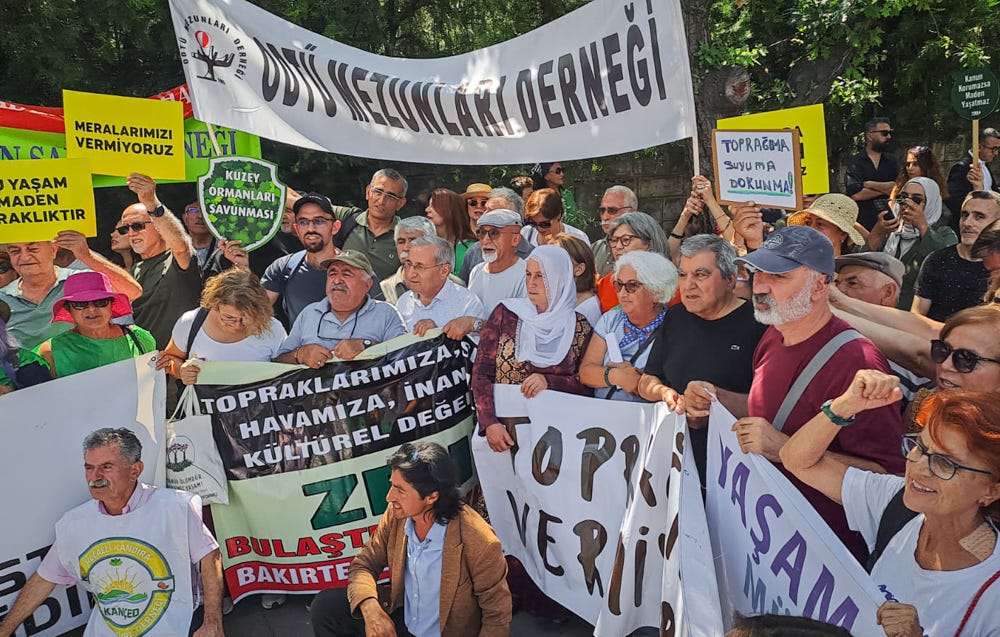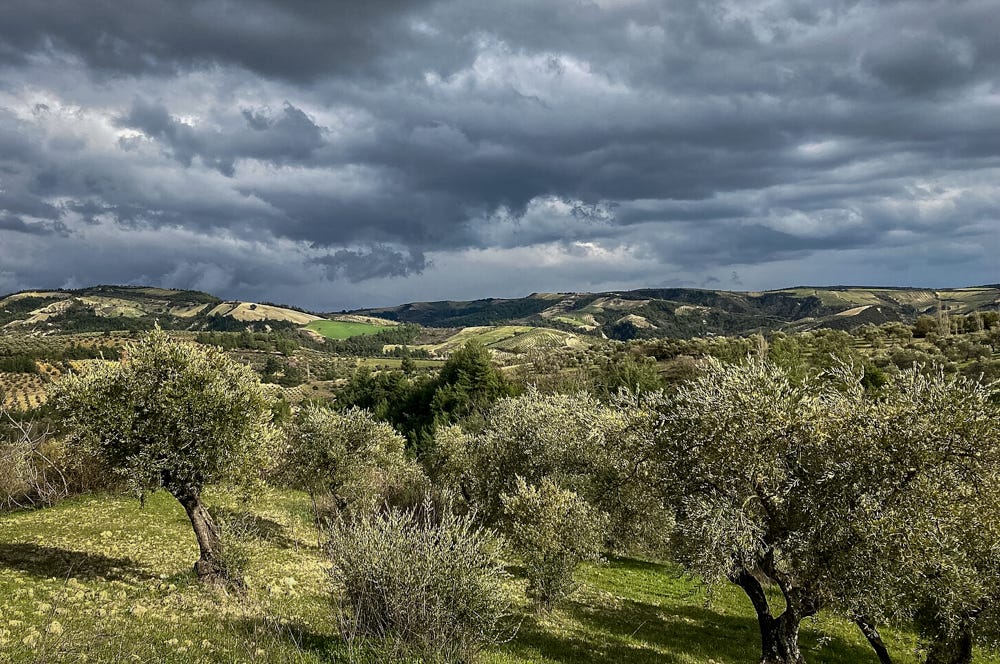
ISTANBUL — Olive trees can live for hundreds of years, if not thousands, producing valuable harvests for generations of farmers. In Turkey, about 500,000 families produce olives, and the fast-growing sector now leads the world in table olive exports.
Yet, after weeks of protests and parliamentary debates, the olive sector will soon compete for land with the energy and resource sector in Turkey.
In a 255-199 vote Saturday, lawmakers approved an omnibus bill opening olive groves, forests and pasture lands to mining activities, essentially deregulating and fast-tracking resource extraction from previously protected areas.
Critics and political opponents of the bill claim it prioritizes corporate profits over farmers and their communities, while also causing long-lasting environmental damage in some of Turkey’s top olive-producing regions.
“On one side, is the thousand-year labor of the villager. On the other, the five-to-ten-year profit of a few bosses. And that’s the point,” Tahsin Ocaklı, a deputy for Rize with the main opposition Republican People’s Party (CHP), told Turkey recap.
“This law will grant authority to the vice president and four ministers. This board will determine which company will do what where, and then will allow mining and energy work … with a super permit.”
The ‘super permit’
The core of the legislative reforms introduces the concept of “süper izin” or a “super permit” that accelerates and centralizes the government authorization procedures related to mining activities across Turkey.
In practice, a board selected by the president will have the mandate to declare projects “critical” or “strategic” for national interests, allowing mining companies to override resource development restrictions in historically protected areas, such as olive groves and forests.
Additionally, the reforms limit the licensing period to four months, requiring relevant institutions to provide an environmental impact assessment (EIA) opinion within three months of application, with a maximum one-month extension.
If the assessment cannot be completed within this period, the institution's opinion will be accepted as “positive”, and the project will be “approved.”
“The country has many difficult situations, from the economy to other things. They probably see this as an economic way out, but mining lobbies are very powerful. They will sell you hell as heaven,” Deniz Ataç, chair of the TEMA foundation, told Turkey recap.
“Let me tell you, ninety-three percent of Gümüşhane [province] is licensed for Group IV mines. How can such a thing be possible?” she asked, referring to a highly-polluting mining classification for precious metal extraction that permits the use of chemicals like cyanide.

History of olive grove protection
Turkey’s Olive Grove Law was first enacted on February 1, 1939, officially known as Law No. 3573 on the Improvement of Olive Cultivation and Grafting of Wild Olives.
Its objective was to increase the number of olive groves, boost olive production and protect olive growing areas. Critically, Article 20 of the law stated no facility releasing chemical waste and/or emitting dust could be established less than 3 km from olive growing areas.
Several modifications were made over the decades, but the Justice and Development Party (AKP) government made the first organized attempt to amend olive grove protection laws in 2012. Lawmakers argued for deregulation to permit energy and mining projects in the “public interest”, but the bill was not passed due to protests at the time.
Another bill seeking to expand urban development into olive growing areas was submitted and withdrawn in 2017. Then, in 2022, the Ministry of Energy introduced a regulation through a directive to allow temporary energy projects in olive groves, which also did not pass.
While many legal reforms failed to pass in recent decades, the AKP government has granted permits for mines, power plants and industrial zones in protected areas through other regulatory changes.
The deputies and mining interests behind the bill
On June 13, a 21-article proposal titled “Bill on Amendments to Certain Laws” was submitted to the parliament’s Industry, Trade, Energy, Natural Resources, Information and Technology Commission.
The proposal had the signatures of 115 deputies, including AKP deputies who own mining companies. Among them was AKP Iğdır Deputy Cantürk Alagöz, owner of Alagöz Holding, which operates in the mining and energy sectors.
Another signatory was AKP Batman Deputy Ferhat Nasıroğlu, owner of the Fernas Madencilik mining company. Workers at Nasıroğlu’s company in Soma, Manisa, protested for about two months against occupational safety issues, low wages and labor exploitation until an agreement was reached in October 2024.
AKP Çorum Deputy Yusuf Ahlatçı is also among the signatories. He is the nephew of Ahmet Ahlatçı, owner of Ahlatçı Holding, one of Turkey’s largest gold exporters.
Additionally, AKP Denizli Deputy Şahin Tin was a signatory. Tin previously sought to develop gold extraction projects in Sudan.
Commenting on the proposal in June, the parliamentary commission’s chair Mustafa Varank said ensuring energy security has become a matter of survival for nations, and the reforms would expedite resource extraction.
“Permit processes are not completed within reasonable times,” Varank said. “Considering the operating license periods, a large portion of these periods is spent in the permit stages, and production begins many years later.”
“This proposal is not just a legal regulation, it’s a transition to a new phase in Turkey’s energy and mining strategy,” he added.
Societal and environmental implications
The bill was widely protested by citizens and farmers who saw it as a legal avenue for mining companies to expropriate private land.
“It’s practically an organized crime declaration. It’s a campaign of plunder against nature, humanity, life, farmers, villagers and the future,” said Ahmet Şık, Istanbul deputy for the Workers’ Party of Turkey.
Some farmers and environmental organizations also staged protests outside Turkey’s parliament as the bill was debated this month. The TEMA Foundation’s Deniz Ataç underlined the bill would increase the number of highly-polluting Group IV mining projects throughout the country.
Such projects may use tailings ponds – a slurry of toxic chemicals and mine waste – which can contaminate fresh water resources and are prone to collapse, resulting in events like the deadly landslide at a gold mine in İliç, Erzincan, last year.
“Let’s say we did everything perfectly. We still don’t have the personnel … to supervise all this, to control such a large mining mobilization,” Ataç told Turkey recap. “What’s actually happening is this: We are jumping into boiling water, or an acid well, without any protective equipment on us.”
The mining reforms include provisions overseeing clean-up costs and environmental restoration requirements, such as forest renewal projects, once the mining operations are complete.
Challenges in relocating olive trees
Regarding olive groves, the reforms also call for the relocation of olive trees to reduce impacts on the olive sector and cultivation.
CHP MP Ocaklı noted olive tree relocation projects have a low success rate. Citing relocation case studies conducted in Spain, Greece and Italy, he stated the majority of mature olive trees dried up and died within two years.
“Moving an olive tree means destroying the memory of the soil,” Ocaklı said. “Moving an olive tree means destroying the people who have been active in that region for centuries.”
Ahmet Uslu, of the Çine Life Platform (ÇİYAP), also said uprooting and replanting olive trees is a complex operation. He pointed to a 2023 relocation attempt in Turkey’s Aydın province, in which about 150 olive trees – between 50-60 years old – were replanted. He said only 30 to 35 percent of them successfully rooted after relocation.
“I am an olive grower. Moving an olive tree is not easy,” Uslu told Turkey recap. “I mean, it’s easy if you buy small saplings and plant them … but if you uproot [older trees], especially in this drought, it’s impossible to make it take root. The air is dry, the soil is dry.”
“In short, moving these trees means killing them,” he added.” “They know this, too, but no one cares. Why? Because they promised the miners they would sacrifice olives and land for mines.”
Turkey recap is an independent, reader-supported newsletter that helps people make sense of the fast-paced Turkey news cycle. Contact us: info@turkeyrecap.com.
Subscribe here on Substack (or on Patreon for discount options). Paid subscribers get full access to our recaps, reports, members-only chat and news tracking tools.
Turkey recap is produced by our staff’s non-profit association, KMD. We are an affiliate of the Global Forum for Media Development and aim to create balanced news that strengthens local media by supporting journalists in Turkey.
Diego Cupolo, Editor-in-chief
Emily Rice Johnson, Deputy editor
Günsu Durak, Turkey recap Türkçe editor
Ceren Bayar, Parliament correspondent


